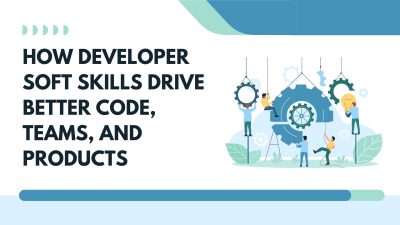I’ve had the privilege of being on both sides of the hiring table. Over the years, I’ve interviewed countless candidates for various software development positions. I can tell you from experience that acing an interview is as much about how you present yourself as it is about your technical expertise.
I’ve learned that it’s not just about knowing how to code; it’s about showing me how well you fit within the team, how you approach problems, and how you can grow within the company.
When I first started interviewing candidates, I quickly realized that some of the most technically skilled individuals struggled in interviews because they didn’t know how to communicate their expertise effectively.
As someone who’s been both a candidate and an interviewer, I’ve refined my approach to evaluating candidates. In this blog, I’m going to share how you can improve interview skills to stand out and succeed.
Table of Contents
Preparation – The First Step to Feeling Confident
If there’s one thing I’ve learned over the years as an interviewer, it’s that preparation is everything. When I conduct interviews, the most prepared candidates always stand out. I remember early in my career as a software developer, I didn’t realize how important preparation was. Now, as someone who hires developers, I can confidently say that it’s a tipping point. Here’s how I recommend candidates improve interview skills through preparation:
- Know the Company Inside Out: Before every interview, make sure to research the company thoroughly. You need to know what drives them, their products, and their culture. When I’m interviewing candidates, it’s clear who’s done their homework. If you want to improve interview skills, take the time to understand the company and show your potential employer you’re genuinely interested.
- Practice Coding Challenges: In every interview, I ask technical questions that test your problem-solving abilities. Practicing coding challenges, especially common algorithms and data structures, will prepare you for what I might throw your way. The more you practice, the more confident you will feel in tackling problems during the interview.
- Have Questions Ready: One thing that always impresses me during an interview is when a candidate asks insightful questions. It shows that you’re thinking beyond just getting the job; you’re thinking about your long-term role in the company. Make sure you come prepared with questions. This is how you can improve interview skills and show you’re engaged.
Show Your Problem-Solving Skills
Over the years of interviewing, I’ve learned that it’s not just about knowing how to code; it’s about how you solve problems. I’ve interviewed many developers who can write flawless code but struggle when it comes to demonstrating their approach to solving problems. To improve interview skills, here’s what I look for during problem-solving discussions:
- Explain Your Thought Process: In my interviews, I always pay close attention to how candidates break down problems. The way you approach a problem is just as important as the solution itself. Take your time to think out loud, explaining how you approach a challenge. This is one of the most effective ways to improve interview skills and show me your logical and analytical thinking.
- Don’t Be Afraid to Ask Clarifying Questions: Sometimes, a problem may not be clear right away. In those moments, I want to see that you’re not afraid to ask questions for clarification. It shows maturity and that you’re being thorough. This not only improves interview skills but also demonstrates your willingness to understand the full scope before diving into a solution.
- Provide Real-World Examples: I love when candidates share specific examples from their previous work. Tell me about a time you faced a tough challenge and how you solved it. Real-world examples give me a deeper understanding of your capabilities and show me that you can handle practical challenges.
Showing Initiative – Proactively Contributing to the Interview
When I interview candidates, I’m always looking for those who show initiative beyond just answering my questions. It’s not enough to simply respond to what I ask; I want to see you actively contribute to the conversation. Here’s how I believe you can improve interview skills by showing initiative:
- Ask Thoughtful Questions: One thing that stands out to me is when candidates ask insightful questions about the role, the team, or the company. It tells me that you’re engaged and thinking about your future with us. Asking questions not only shows you’re interested but also helps improve interview skills by making the conversation more dynamic.
- Suggest Solutions or Ideas: If you’re given a coding problem or scenario, don’t just solve it—tell me how you might approach it or what you would do differently based on your experiences. This shows me you’re thinking ahead, which is a great way to improve interview skills and demonstrate your creativity.
- Share Examples Beyond the Question: I love when candidates go the extra mile to share experiences or ideas that go beyond what I asked. This isn’t just about answering the question but providing additional context or examples that highlight your skills. This is another way to improve interview skills and show your full potential.
Communication – The Key to Presenting Yourself Well
Over time, I’ve realized that while technical skills are essential, effective communication is what truly sets candidates apart. I can teach someone to code, but I can’t teach them to communicate effectively. As an interviewer, I’ve seen many candidates struggle with communication, even when they have great technical abilities. Here’s how you can improve interview skills in terms of communication:
- Be Clear and Concise: One thing I value during interviews is clarity. I appreciate candidates who get straight to the point while providing enough detail to show their expertise. When I ask you a question, I want to hear a clear, concise answer. If you can do this, you’re already ahead of the curve. Being clear is one of the best ways to improve interview skills and keep the conversation focused.
- Keep Your Answers Focused: In interviews, I often get responses that veer off into unrelated topics. It’s important to stay focused on the question at hand. If you’re asked about a particular framework, answer with details about that framework and avoid wandering into unrelated topics. Being able to stick to the topic at hand is an essential skill to improve interview skills.
- Practice Active Listening: As an interviewer, I appreciate when candidates really listen to the question before responding. It shows that you’re attentive and thoughtful in your answers. Active listening is key to providing the best responses, and it’s a crucial part of improving interview skills.
Confidence Without Arrogance – Striking the Right Balance
Confidence is important in an interview, but it’s essential to strike the right balance between confidence and humility. As an interviewer, I look for candidates who are confident in their skills but also open to feedback and learning. Here’s how to improve interview skills by balancing confidence:
- Don’t Overstate Your Abilities: While it’s important to be confident, it’s equally important to be honest about your skills and experience. I appreciate candidates who acknowledge areas they’re still learning and show a willingness to grow. This is a great way to improve interview skills and demonstrate that you’re humble yet confident.
- Own Your Achievements, But Stay Humble: When discussing your past work or accomplishments, make sure to own your contributions. However, avoid coming across as boastful. Give credit to your team and acknowledge how collective efforts led to success. This humility can greatly improve interview skills and demonstrate emotional intelligence.
- Respond Well to Criticism: Confidence is also about how you handle feedback. If I provide constructive criticism during the interview, show that you can accept it gracefully and use it as a learning opportunity. This not only improves your interview skills but also signals maturity and professionalism.
Soft Skills – Building Rapport and Connecting with Your Interviewer
While technical knowledge is a huge part of software development, soft skills are often what make a candidate truly stand out. As an interviewer, I’m looking for someone who can not only do the work but also be a good fit for the team. Here’s how to improve interview skills by focusing on your soft skills:
- Show Enthusiasm: I can tell right away when a candidate is genuinely excited about the role. Enthusiasm is contagious, and it shows me that you care about the opportunity. If you want to stand out, show your passion for the role. Enthusiasm will help you improve interview skills and make a positive impression.
- Stay Calm Under Pressure: Software development can be stressful, and the interview process can feel that way too. It’s important to stay calm, even when you’re faced with difficult questions or challenges. Remaining composed under pressure is an important trait, and it helps you improve interview skills by demonstrating emotional intelligence and resilience.
- Be Yourself: As an interviewer, I appreciate authenticity. Don’t try to be someone you’re not. When you’re genuine, it’s easier for me to connect with you as a person, not just as a candidate. Being yourself is one of the simplest but most effective ways to improve interview skills.
Taking Responsibility – Owning Your Success and Mistakes in Interviews
I place a lot of value on accountability during interviews. When discussing past projects, I appreciate candidates who can own both their successes and their mistakes. Here’s how I believe you can improve interview skills by taking responsibility:
- Own Your Achievements: When I ask about your accomplishments, I want you to take ownership of your contributions. Be proud of what you’ve done, but do it in a humble way. Acknowledging your role in the success of a project shows maturity, which will definitely improve interview skills.
- Acknowledge Mistakes and Learn from Them: Everyone makes mistakes, but not everyone is willing to admit them. I appreciate when candidates discuss what went wrong in a project, but more importantly, how they learned from it and applied those lessons moving forward. This is a great way to improve interview skills and show self-awareness.
- Highlight Team Collaboration: While it’s important to take responsibility for your own work, I also want to hear about how you contributed to team successes. Giving credit to your team while owning your role in the project is a great way to demonstrate humility, which improves interview skills and shows your ability to work collaboratively.
Adaptability – Demonstrating Flexibility in a Software Developer Interview
In the fast-paced world of software development, things change quickly, and adaptability is key. I highly value candidates who show they can adapt to new tools and environments. Here’s how I see you can improve interview skills by demonstrating flexibility:
- Show Willingness to Learn New Technologies: When I ask you about a tool or framework you haven’t worked with before, don’t shy away from it. I respect candidates who admit they don’t know something but show a strong desire to learn. This willingness to adapt and learn new technologies will definitely improve interview skills and prove your commitment to growth.
- Describe How You’ve Adapted to Change in the Past: I love hearing stories of how candidates have dealt with change in their previous roles. Whether it’s a new technology or a shift in project scope, showing how you managed change in the past helps me understand how adaptable you are, which is a key way to improve interview skills.
- Remain Open to Feedback: If I provide feedback during the interview, I want to see how you respond to it. Candidates who are receptive to constructive criticism and adjust their approach demonstrate real adaptability. This kind of openness not only improves interview skills but also shows me that you can thrive in a dynamic work environment.
Being Prepared for Follow-Up Questions – Anticipating What’s Next
Interviews are rarely just one question and done. As an interviewer, I often ask follow-up questions to dig deeper into a candidate’s responses. The best candidates are the ones who anticipate these follow-ups and are prepared for them. Here’s how you can improve interview skills by being prepared for follow-up questions:
- Think Ahead About Your Answers: Before an interview, review common questions and anticipate possible follow-ups. For example, if you’re discussing a project you’ve worked on, I might ask how you overcome specific challenges. By thinking about potential follow-up questions, you’ll be more prepared to provide in-depth answers, improving your interview skills.
- Stay Calm When Asked a Follow-Up: When I ask follow-up questions, it’s not to throw you off—it’s to understand your thought process better. Don’t rush your answer. Take a moment, think about the question, and then respond confidently. Showing that you can handle unexpected follow-ups gracefully can improve interview skills and show your composure.
- Clarify If Needed: If a follow-up question is unclear, don’t hesitate to ask for clarification. This shows that you’re careful in your responses and not afraid to ensure you understand what’s being asked. This openness will help improve interview skills and show you’re proactive about getting things right.
Learn from Feedback – How to Keep Improving Your Interview Skills
Feedback is a powerful tool for growth, and as an interviewer, I’m always open to providing feedback. After each interview, I reflect on how the candidate did, and I encourage candidates to do the same. If you want to improve interview skills, here’s how you can leverage feedback:
- Reflect on Your Performance: After each interview, take time to reflect on how it went. What went well? What could you have done better? I encourage candidates to ask themselves these questions after each interview. By reflecting, you’ll gain valuable insights into areas that need improvement.
- Seek Constructive Criticism: Don’t be afraid to ask for feedback after an interview. Whether you’re hired or not, constructive feedback can be invaluable. I always give candidates suggestions on how to improve, and if you ask for feedback, it shows maturity and a desire to grow. This is a great way to improve interview skills.
- Practice Makes Perfect: The more you practice, the better you’ll become. Mock interviews are an excellent way to prepare. I recommend that candidates practice with peers, or even record themselves, to refine their performance. Practicing regularly will help you improve interview skills and feel more confident when it counts.
Conclusion
As the owner of Qtec Solution Limited, I can tell you that improving interview skills is just as important as improving your technical expertise. The more you prepare, the better you’ll communicate, and the more confident you’ll feel in an interview. Technical skills are essential, but soft skills, communication, and problem-solving ability are what truly set candidates apart.
If you’re looking to land your dream job in software development, take the time to improve interview skills. It’s not just about answering technical questions; it’s about how you present yourself, how you solve problems, and how you connect with your interviewer. With the right approach, you’ll stand out as the ideal candidate and take the next step in your career.
Frequently Asked Questions
How can I improve interview skills for software development positions?
To improve your interview skills, focus on preparation, effective communication, problem-solving techniques, and showcasing both your technical and soft skills. Practice mock interviews, and seek feedback to continuously refine your performance.
What’s the best way to handle tough technical questions in an interview?
When faced with difficult technical questions, break the problem down, explain your thought process, and stay calm. Ask for clarification if needed, and always focus on demonstrating how you approach the problem rather than just solving it.
How important are soft skills in software development interviews?
Soft skills are incredibly important. While technical skills are necessary, soft skills like communication, teamwork, and emotional intelligence are what make you a great developer and a valuable team member. They can often be the deciding factor in getting hired.




